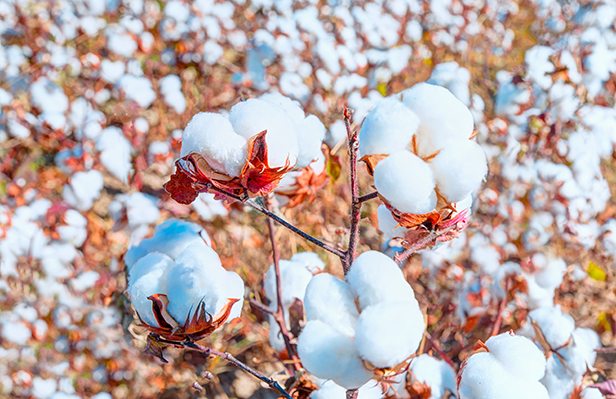News December 04, 2020
Ban on Some China Cotton Could Affect Promo
Cotton and products produced by Xinjiang Production and Construction Corps will not be allowed to enter the U.S.
A new federal ban on all cotton and cotton products produced by the China-based Xinjiang Production and Construction Corps (XPCC) has potential to affect apparel and textile supply chains in retail, the promotional products industry and beyond.

The U.S. Department of Homeland Security said on Wednesday, Dec. 2 that U.S. Customs and Border Protection (CBP) personnel at all U.S. ports of entry will detain shipments containing cotton and cotton products originating from XPCC.
The Withhold Release Order (WRO) is based on federal authorities’ belief that XPCC, described by Reuters as a powerful quasi-military organization, uses the forced labor of detained ethnic minority Uighur Muslims in China’s Xinjiang region to produce cotton and cotton products.
“China’s systemic abuse of forced labor in the Xinjiang Region should disturb every American business and consumer,” said CBP Acting Commissioner Mark A. Morgan. “Forced labor is a human rights violation that hurts vulnerable workers and introduces unfair competition into global supply chains.”
Authorities said the WRO applies to all cotton and cotton products produced by the XPCC and its subordinate and affiliated entities, as well as any products that are made in whole or in part with or derived from that cotton, such as apparel, garments and textiles.
The Withhold Release Order (WRO) on XPCC cotton products is the 6th enforcement action that @CBP has announced in the past 3 months against goods made by forced labor from China’s Xinjiang Uyghur Autonomous Region.
— CBP Mark Morgan (@CBPMarkMorgan) December 2, 2020
As of 2015, XPCC produced about 30% of China’s cotton. China is the world’s third-largest cotton-producing nation, behind India and the United States.
Brenda Smith, the CBP’s executive assistant commissioner for trade, told Reuters that the WRO will compel apparel firms and other companies shipping cotton products to the United States to eliminate XPCC-produced cotton fiber from many stages of their supply chains.
Reacting to the news, some analysts said it will be difficult for western brands to root out if XPCC cotton was used somewhere along the lines in the creation of their products, in part due to the opacity of supply chains in China.
A China-based cotton trader who spoke to Reuters said that proving that no XPCC cotton is in a product will be “extremely difficult” and speculated that manufacturing costs will rise as part of efforts to provide such proof.
Following the announcement of the WRO, the American Apparel and Footwear Association, National Retail Federation, Retail Industry Leaders Association, and The United States Fashion Industry Association released a statement effectively saying they support the ban on XPCC. They noted in particular that the import detainment order was specific to XPCC; earlier this year, U.S. apparel makers criticized a proposed ban on all cotton produced in Xinjiang.
“Our industry condemns forced labor and strives to eradicate it whether in China or elsewhere in the world,” read the statement from the American Apparel and Footwear Association and others. “Clearly defined WROs based on specific and actionable intelligence greatly supplement our own considerable enforcement activity, and we look forward to working with CBP to build a detailed and practical implementation strategy to make sure today’s actions are effective, enforceable and focused on the bad actors who insist upon exploiting slave labor.”
Some leading promo apparel suppliers told Counselor that they’ve been taking steps to move supply chains away from China because of concerns that include forced labor in Xinjiang and import tariffs on Chinese goods imposed by President Donald Trump’s administration.
“We’ve spent the past several years moving out of China due to the tariffs so many changes were already in motion,” said Jeremy Lott, president/CEO of SanMar (asi/84863), the largest supplier in the North American promo industry. “As we became more aware of the issue of forced labor in Xinjiang, it only gave us more reason to seek other sourcing destinations. In the meantime, we’ve been monitoring the situation and don’t believe the ban on some cotton will impact our supply chain.”
Andrea Lara Routzahn of Top 40 supplier alphabroder (asi/34063) issued a statement regarding Xinjiang and the private brands that alphabroder manufactures directly – North End, Devon & Jones, Ultra Club, Harriton, CORE 365 and TEAM 365.
“We conducted a traceability and transparency assessment of our active Private Brand supply chain and manufacturing partners to evaluate fabric and component origin,” said Routzahn, alphabroder’s senior vice president of portfolio and supplier management.
She continued: “The assessment was done from fabric fiber through fabric finishing, and development and manufacturing of components used for our Private Brand styles. Based on the assessment, we determined that no items used in the manufacturing of alphabroder Private Brand apparel styles is from the Xinjiang region of China. As a category B member of the Fair Labor Association (FLA), alphabroder is in alignment with the guidance put out by the FLA regarding the Xinjiang Uighur Autonomous Region and the efforts to stop forced labor. We will remain vigilant to ensure that we do not knowingly purchase any components for our goods that originate from the Xinjiang region of China.”
Lott said that promo firms will need to remain committed in their social responsibility efforts to ensure supply chains are free from exploitation. “It’s going to be critical going forward that we work closely with overseas partners to gain a deeper understanding of our supply chains and move out of the Xinjiang region,” he said. “If you haven’t already started, now is the time.”
Concerned over reports of forced labor, the U.S. House of Representatives passed a bill in September that would ban the import of all cotton from the Xinjiang region. The vote was 406-3. Before that bill could become law, it would need Senate approval. As of this writing, a Senate vote had not been scheduled, according to Rep. Jim McGovern.
